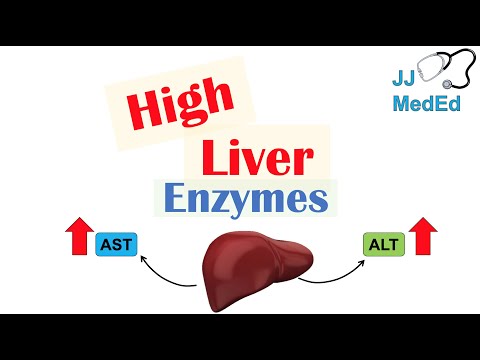A healthy lifestyle is all about balance, and keeping an eye on your health markers is crucial, especially when it comes to high liver enzymes. High liver enzymes—specifically alanine aminotransferase (ALT) and aspartate aminotransferase (AST)—can provide significant insights about your liver health. When these liver enzymes are high, they can indicate underlying issues that, if ignored, might lead you down a path of serious health troubles. So, let’s dive deep into understanding what these high liver enzymes mean and how to tackle them head-on!
![High Liver Enzymes [ALT & AST] – What Do They Mean? – Dr.Berg](https://www.chiseled-magazine.com/wp-content/cache/flying-press/3FeVs-O70qo-hqdefault.jpg)
What Are High Liver Enzymes and Why Do They Matter?
Alright, first things first—what are high liver enzymes? These enzymes play a vital role in the liver’s function, aiding the breakdown of proteins and other substances. When the liver is stressed or damaged, ALT and AST levels usually rise. So if you get a test result showing elevated liver enzymes, don’t just brush it off; it’s a sign your liver might be in distress.
Why are high liver enzymes so essential to monitor? Well, they’re like your liver’s smoke signals. Elevations in these enzymes may not immediately spell disaster, but they can signify early liver dysfunction or inflammation. If you’re chasing that chiseled physique, remember that a healthy liver is critical for effective metabolism and energy levels—your workouts depend on it!

The Common Causes of Elevated Liver Enzymes: Top 5 Factors
Elevated liver enzymes can show up for a variety of reasons. Here are the top five factors that could be throwing your liver off-kilter:

Recognizing the Symptoms of High Liver Enzymes: What to Look Out For
While high liver enzymes might not shout for attention, a few symptoms can serve as your body’s alarm bells that something’s off:

Diagnostic Processes: How Are High Liver Enzymes Detected?
Detecting high liver enzymes generally begins with a simple blood test. Physicians check your ALT, AST, alkaline phosphatase (ALP), and gamma-glutamyl transferase (GGT) levels. If your test shows elevated liver enzymes, it’s essential to dig deeper. Your doctor may recommend further diagnostics, such as imaging tests like ultrasounds or CT scans—or in some cases, a liver biopsy will be necessary. This thorough approach helps pinpoint the cause and severity of your liver issues.

Management and Treatment Options for Elevated Liver Enzymes
Managing high liver enzymes isn’t as daunting as it sounds. It’s all about tackling the underlying cause. Here are effective strategies to get you back on track:
The Impact of Genetics and Personal History on Liver Health
Genetic factors can play a huge role in liver health. Conditions like Wilson’s disease—where copper builds up in your organs—show just how important genetic history is. If liver diseases run in your family, make sure to communicate this to your doctor, so they can tailor preventive measures based on your risk factors.
Your personal history—like previous liver infections—also weighs heavily in assessing your liver’s current state. Understanding the interplay of genetics and personal health history is crucial in addressing elevated liver enzymes.
Addressing the Alarm: Taking Action on High Liver Enzymes
When it comes to high liver enzymes, awareness and action are your best friends. This warning sign doesn’t always point toward severe dysfunction, but it’s essential to recognize the implications. Ignoring high liver enzymes could escalate into even larger health problems down the road.
Take charge of your health! By understanding the causes, recognizing the symptoms, and seeking timely medical advice, you empower yourself to make a significant difference. Incorporate lifestyle changes, manage related health issues, and keep those health screenings regular. Remember that your liver’s health impacts your overall well-being, and taking action now can set you up for a future full of vitality and vigor. Your liver will thank you for it!
So step up, arm yourself with knowledge, and embrace a healthier lifestyle today. Click here to discover more about transforming your health, or explore additional insights on other key health topics like What Causes eye twitching. Start now, because being shredded and healthy isn’t just about looking great—it’s about feeling great!
High Liver Enzymes: Fun Trivia and Interesting Facts
What High Liver Enzymes Mean for You
High liver enzymes can be a cause for concern, and understanding their significance is crucial. Interestingly, elevated enzyme levels might be the body’s way of signaling that something’s off. Did you know that lifestyle choices can significantly impact liver health? For instance, factors like excessive alcohol consumption and poor diet can lead to damage over time. Just like how Scabs indicate your body is healing, high liver enzymes reveal underlying issues that just can’t be ignored.
The Signs and Symptoms
While not everyone with high liver enzymes shows symptoms, some might notice unusual signs. For instance, coughing up yellow mucus can sometimes indicate underlying liver issues among other health problems. It’s fascinating how interconnected our bodily systems are! If you ever find yourself feeling fatigued or experiencing jaundice—that yellowing of the skin—it’s time to pay attention and consult your doctor. Just as a femur fracture is a clear sign something’s wrong, high liver enzymes should raise red flags that warrant a closer look.
The Importance of Timely Action
Ignoring these warning signs can lead to serious health complications in the long run. Awareness is always the first step—much like how Jill Stein revamps discussions in politics, staying informed about liver health can prompt proactive measures. If you make changes early on, it could save you a whole lot of troubles later! And for those who love their Hey Dudes shoes, remember: taking care of your health is the best fashion statement of all. In a world where knowledge is power, understanding high liver enzymes can become your best tool for maintaining a vibrant life.



























